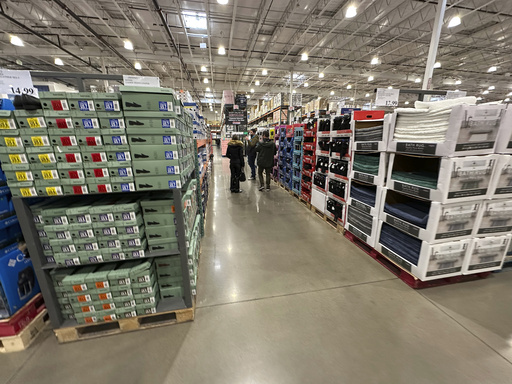WASHINGTON—In February, U.S. consumer confidence took a sharp nosedive, marking the most significant monthly decline in over four years, according to a business research group’s analysis. Inflation remains a persistent issue, and an increasing number of Americans view a trade war under President Donald Trump’s administration as inevitable.
The Conference Board’s report indicated that the consumer confidence index dropped significantly to 98.3 in February from 105.3 the previous month. This figure starkly contrasts with the expectations of economists, who had predicted a reading of 103, based on a FactSet survey.
The seven-point plunge is the steepest since August 2021.
This downturn immediately affected Wall Street, with the S&P 500 slipping 0.6% during midday trading. Meanwhile, the Dow Jones Industrial Average remained steady, and the Nasdaq tumbled by 1.1%.
According to the board’s survey, there were widespread concerns about inflation, with a noticeable increase in mentions related to trade and tariffs.
The report stated that the measure of Americans’ short-term expectations about income, business, and employment declined by 9.3 points, settling at 72.9. A reading below 80 often signals the potential onset of a recession.
Moreover, the percentage of consumers anticipating a recession over the next year reached its highest point in nine months.
The perception of current conditions fell by 3.4 points, resulting in a score of 136.5. This downturn extended to opinions on the current labor market as well.
“There was a noticeable weakening in perceptions of the labor market,” the report noted. “Consumers grew more pessimistic about future business conditions and less optimistic about future income,” it continued. Worries about future employment opportunities also increased, reaching a ten-month peak.
Heading into late 2024, consumers felt more confident and spent freely during the holiday season. However, U.S. retail sales dropped significantly in January, with frigid weather partly blamed for decreased vehicle and retail sales.
The Commerce Department reported last week that retail sales fell by 0.9% last month compared to December, marking the most substantial decline in a year after two months of solid gains.
Inflation remains stubbornly high, prompting the Federal Reserve to adopt a cautious stance on interest rates. The Fed left its benchmark borrowing rate unchanged at its last meeting, having reduced it in the three prior meetings. Fed officials have also voiced uncertainty regarding the new administration’s policies.
Recent economic data coupled with growing pessimism among American households present challenges for the U.S. economy, according to experts.
Carl Weinberg, chief economist at High Frequency Economics, noted in a client note, “Given the indicators reflecting decreasing consumer and business confidence and sentiment, we anticipate a slowing economy.”
The consumer confidence index evaluates both Americans’ assessment of present economic conditions and their six-month outlook.
Consumer spending, which constitutes about two-thirds of U.S. economic activity, is a critical indicator monitored by economists to gauge consumer sentiment.


